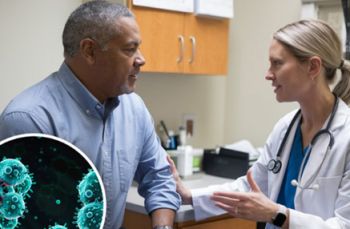
Jack Morton Auditorium
Media and Public Affairs Building
805 21st Street, NW
Washington, DC 20052
GW Cancer Center experts explain how researchers have advanced new treatments that empower the body's natural immune system to fight cancer.
Hosted by:
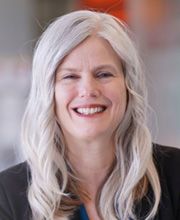
Julie Bauman, MD, MPH
Dr. Cyrus Katzen Family Director, GW Cancer Center
Associate Dean of Cancer, GW School of Medicine and Health Sciences
Professor of Medicine
- Read Dr. Bauman's Bio
-
Julie E. Bauman, MD, MPH is the Dr. Cyrus Katzen Family Director of the GW Cancer Center as well as associate dean of cancer and professor of medicine at the GW School of Medicine & Health Sciences.
Bauman completed a dual MD/MPH degree at Tufts University School of Medicine, internal medicine residency at the University of Utah and medical oncology fellowship at the University of Washington / Fred Hutchinson Cancer Research Center. Her education and training, at the intersection of oncology and public health, resulted in unique expertise in clinical trial design. As a recipient of the prestigious National Institutes of Health (NIH) National Cancer Institute (NCI) Clinical Investigator Team Leadership Award, Bauman is a nationally recognized leader in cancer therapeutics for both prevention and treatment, with more than 150 publications and a long track record of NIH team science funding.
Bauman is the co-principal investigator of the UA Cancer Prevention Clinical Trials Network, one of only five NCI-funded clinical trial networks devoted to drug development for cancer prevention. Her own research focuses on so-called "green chemoprevention," or the use of whole plants or their extracts for cancer prevention. Bauman also leads multiple national clinical trials for the treatment of head and neck cancer, with dedicated expertise in precision medicine and immunotherapy. She is the current co-chair of the NCI Cancer Prevention Steering Committee as well as the co-chair of the NCI Head and Neck Steering Committee’s PULA Task Force. Bauman is also a 2020 graduate of the premiere Executive Leadership in Academic Medicine fellowship for women at the Drexel University College of Medicine.
Panelists:
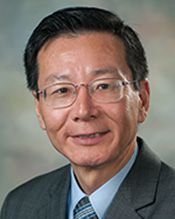
Rong Li, PhD
Chair, Department of Biochemistry & Molecular Medicine
Ross Professor of Basic Science Research
Professor of Biochemistry and Molecular Medicine
- Read Dr. Li's Bio
-
Dr. Rong Li has been working in gene regulation and breast cancer biology for more than two decades. He received his Ph.D. degree from the University of California at Berkeley in molecular biology of DNA replication and transcriptional regulation. As a postdoctoral fellow at the Cold Spring Harbor Laboratory, he expanded his research scope to include cell cycle regulation, DNA repair and DNA damage response. Since he became an independent investigator, first at the University of Virginia (1996-2006) and later at University of Texas Health Science Center at San Antonio (2007-2018), Dr. Li has led a productive research endeavor in several areas of breast cancer-related biomedical research. One major focus in his research is the role of the breast cancer susceptibility gene product BRCA1 in tissue-specific tumor suppression. Another research topic in his lab involves transcriptional regulation by RNA polymerase II-pausing factors during normal tissue homeostasis and pathogenesis. A third active research area in Dr. Li’s lab is the crosstalk among tumor, fat, and immune cells during cancer progression.
Dr. Li currently is chair of the Department of Biochemistry and Molecular Medicine, the George Washington University School of Medicine & Health Sciences. He is the Ross Professor of Basic Science Research. Dr. Li has published over 80 scientific papers, many in high-impact journals including Nature, Cell, Genes Dev, Cell Rep, Nat Commun, PNAS, and J Clin Invest. Dr. Li has served on several NIH study sections and currently is chair of the National Institutes of Health (NIH) Tumor Microenvironment (TME) study section. Dr. Li’s research has been continuously funded for more than two decades by NIH and other federal, state and private funding agencies.
Please visit the Li Lab.
View Dr. Rong Li's published works.

Pavani Chalasani, MD, MPH
Division Director, GW Cancer Center
Professor of Medicine
Professor of Biochemistry and Molecular Medicine (Secondary)
- Read Dr. Chalasani's Bio
-
Pavani Chalasani, MD completed her medical school at Gandhi Medical College in India and completed her Internship, Residency and Fellowship in Hematology-Oncology at the University of Arizona, Tucson. Dr. Chalasani was a part of the University of Arizona Cancer Center (UACC) as a faculty member focusing on breast cancer where she was very active in clinical and translational research.
Her key research interest is in the development of biomarkers- imaging, blood-based or tissue. She is the Principal Investigator on several investigator-initiated, industry-sponsored, and co-operative group protocols. She is the medical oncology study chair on S1706, a NCTN study for patients with inflammatory breast cancer. She was awarded the prestigious NCI’s Clinical Cancer Investigator Team Leadership Award in 2020. She served as Program Director for Hematology-Oncology Fellowship program while at the UACC. She has received research funding from NIH/NCI, American Cancer Society, Better Than Ever and DOD. She was recruited to be Division Director for Hematology-Oncology at the George Washington University, George Washington Cancer Center (GWCC) and started in her new role 02/01/2023. She is also Co-Program Lead for Clinical Translational Oncology Program at GWCC.
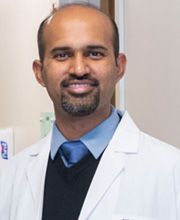
Amarendra Neppalli, MD
Chief, Plasma Cell Disorders
Director, Transplant and Cellular Therapy
Associate Professor of Medicine
- Read Dr. Neppalli's Bio
-
Amarendra Neppalli, MD is a board-certified hematologist and associate professor at the GW School of Medicine and Health Sciences. He is also the chief of plasma cell disorders and director of transplant and cellular therapy at The GW Medical Faculty Associates. Dr. Neppalli takes care of patients with blood cancer, as well as patients undergoing bone marrow transplants. His area of expertise is in plasma cell disorders including multiple myeloma, amyloidosis, and Stem cell transplant.
Dr. Neppalli earned his medical degree from Osmania Medical College in India and completed his internal medicine residency training and fellowship in hematology/oncology at LSU Health Shreveport. He completed another fellowship in bone marrow transplant at Stanford University before joining as faculty at the Medical University of South Carolina. He was the principal investigator on multiple cooperative groups and industry-sponsored clinical trials during his tenure at MUSC. He also served the role of outpatient stem cell transplant director during his tenure there and co-authored multiple peer-reviewed publications.
Dr. Neppalli's research interests include clinical trials investigating novel treatment options for multiple myeloma.
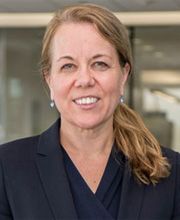
Catherine Bollard, M.B.Ch.B., MD
Associate Center Director for Translational Research and Innovation, GW Cancer Center
Professor of Pediatrics
Professor of Microbiology, Immunology, and Tropical Medicine (Secondary)
- Read Dr. Bollard's Bio
-
Catherine Bollard, M.B.Ch.B., M.D., is the Director of the Center for Cancer and Immunology Research at the Children’s National Research Institute, Director of the Program for Cell Enhancement and Technologies for Immunotherapy and a member of the Division of the Blood and Marrow Transplantation. In addition, she is a Professor of Pediatrics and Microbiology, Immunology and Tropical Medicine at the George Washington University and is the ACD for Translational Research and Innovation within the George Washington Cancer Center. In these roles, Dr. Bollard leads clinical and research efforts to fight cancer and other inflammatory diseases by strengthening the immune system using adoptive cell therapy. As a past president of the International Society of Cellular Therapy, and the current president of the Foundation for the Accreditation for Cellular Therapy (FACT) she is a distinguished hematologist, immunologist and immunotherapist, working to develop cell and gene therapies for patients with cancer and underlying immune deficiencies.
Additionally, Dr. Bollard is interested in stem cell and cord blood transplantation and improving outcomes by decreasing infectious complications and preventing relapse. She also has a specific interest in targeting viral infections in immune-suppressed patient populations, including individuals living with the human immunodeficiency virus. Dr. Bollard is a member of the American Society for Clinical Investigation (ASCI). She chaired the Non-Hodgkin Lymphoma (NHL) Committee of the Children’s Oncology Group from 2012-2020. She served on the Board of Directors of the Foundation for the Accreditation of Cellular Therapy (FACT) from 2010-2018 and in 2020 was appointed to President-Elect of FACT and in January 2021 started serving her term as President. Additionally, Dr. Bollard was a member of the Cellular, Tissues and Gene Therapies Advisory Committee of the Food and Drug Administration (FDA) from 2015-2019 and completed a six-year term on NCI’s Clinical Oncology (CONC) Study Section also in 2019. In 2019, she became a member of the Frederick National Laboratory Advisory Committee (FNLAC) for the NIH and an ad hoc member of the Pediatric Oncologic Drugs Advisory Committee (ODAC) for the FDA. She has been an Associate Editor for the journal Blood since 2014 and in 2020 was appointed Editor in Chief of Blood Advances (starting Fall 2021). Dr. Bollard has peer-reviewed more than 200 publications and has been continuously and independently NIH-funded for over a decade.
As a national and international leader in the immunology and immunotherapy space, Dr. Bollard’s work expands our understanding of cancer, immune deficiencies and viral infections in pediatric and adult patients. She joined Children’s National in 2013 from the Baylor College of Medicine where she was a tenured professor in the Department of Pediatrics. She received a medical degree from Otago University Medical School in New Zealand.